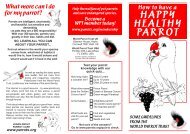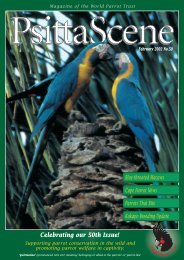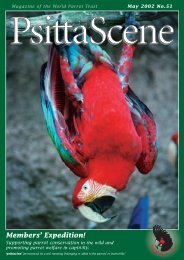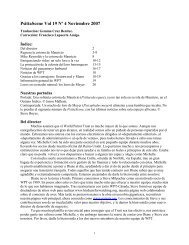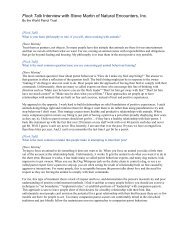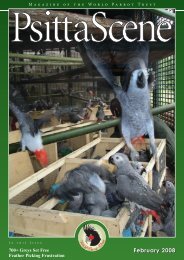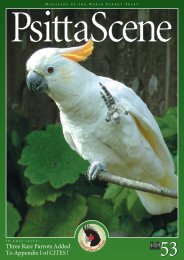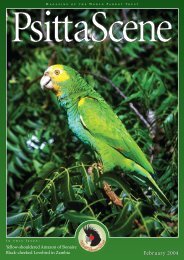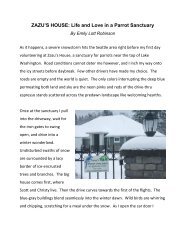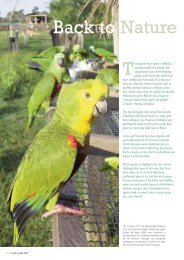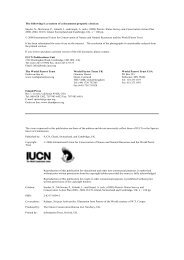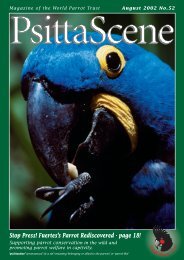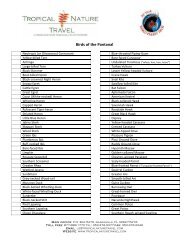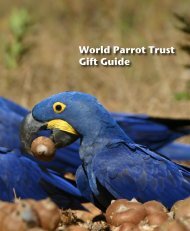Download - World Parrot Trust
Download - World Parrot Trust
Download - World Parrot Trust
You also want an ePaper? Increase the reach of your titles
YUMPU automatically turns print PDFs into web optimized ePapers that Google loves.
during the last 5 years, out of an<br />
estimate of 130 birds.<br />
2. The second stage is<br />
ordering the bird. This<br />
activity is generally carried out<br />
in residences, street markets or<br />
roads. The birds are transported<br />
to the selling sites and<br />
temporarily hidden in the<br />
neighbourhood. The rare species<br />
are commercialised with<br />
potential buyers in the street<br />
markets under the false<br />
pretence of buying/selling<br />
common birds. In this kind of<br />
commerce the birds for sale are<br />
usually baby macaws, parrots,<br />
toucans and other equally<br />
valuable species. The order<br />
trade has been developed in the<br />
last ten years, exactly when<br />
IBAMA started to be active in the<br />
street markets.<br />
3. The third stage focuses on<br />
rare animals - those birds<br />
which are not exhibited in the<br />
street markets and are intended<br />
for a particular type of buyer.<br />
Rare species as well as other<br />
special animals are captured<br />
upon the request of some<br />
Brazilian collectors, who either<br />
keep them or export them<br />
abroad. The animals can be<br />
traded for other rare species, or<br />
sold. This traffic is made easy<br />
by the lack of knowledge of the<br />
airport customs officials on the<br />
Brazilian species.<br />
4. The fourth stage is related<br />
to the egg traffic of rare<br />
species. This is an activity<br />
which has been increasingly<br />
developed during the last ten<br />
years due to several factors.<br />
Currently, effective initiatives to<br />
eradicate the illegal trade of<br />
animals are being intensified at<br />
airports in an attempt to stop<br />
the bird traffic. Also the project<br />
implemented by CITES includes<br />
the control of the species in<br />
other countries and promotes<br />
the repatriation of the birds to<br />
their country of origin.<br />
Furthermore modern technology<br />
has led to improvements such<br />
as efficient portable incubators<br />
for egg hatching, and balanced<br />
food rations developed by<br />
international companies, thus<br />
rendering the egg traffic more<br />
lucrative and a safe alternative.<br />
Another factor which should be<br />
taken into consideration is the<br />
official sanction of the Brazilian<br />
government to the trade of<br />
Not wild-caught, this tame Blue-fronted Amazon enjoys meeting people.<br />
Brazilian birds hatched in<br />
captivity. Considering that the<br />
traffic of chicks and eggs<br />
(especially of the parrot and<br />
macaw species) is growing<br />
steadily, these two factors can<br />
sometimes be used by<br />
unscrupulous breeders to<br />
legalise chicks and eggs<br />
originating from the clandestine<br />
market. The procedure is to<br />
band these birds afterwards. To<br />
avoid this practice, it is<br />
necessary to adopt a special<br />
legislation which requires DNA<br />
testing to determine the<br />
parentage of the birds traded in<br />
the official market.<br />
Reintroduction<br />
programme<br />
CETAS (Sylvan Animals Selection<br />
Center - CETREL/IBAMA) was<br />
founded in 1997 by CETREL and<br />
IBAMA to reintroduce<br />
confiscated birds to their<br />
natural habitat. Other aims were<br />
to develop efficient ways of<br />
curing diseases which affect<br />
birds and to prevent their<br />
dissemination; and to research<br />
reintroduction techniques to<br />
facilitate the safe release of<br />
birds to avoid procedures which<br />
could jeopardise birds in the<br />
wild. Operating for one full year,<br />
CETAS has already received<br />
4,805 birds of 121 different<br />
species, many being passerines.<br />
When admitted, they receive<br />
antibiotics (penicillin and sulfa),<br />
vermifuge and vitamins.<br />
Successful reintroduction should<br />
include specific procedures such<br />
as arranging feeders with<br />
different types of food in<br />
strategic locations for their first<br />
days of freedom. In the next 15<br />
to 20 days the birds will be able<br />
to search for food in their new<br />
habitat.<br />
Of the birds received, 68<br />
percent have been freed, 11<br />
percent will be set free and 21<br />
percent have died. Of the 22<br />
species ready to be introduced,<br />
some deserve to be mentioned:<br />
the Blue-fronted Amazon<br />
(Amazona aestiva xanthopteryx)<br />
totalled 105 specimens; 80<br />
Lear’s Macaws near Curaca, Brazil.<br />
percent are young birds ready to<br />
be reintroduced to the<br />
brushwood covered region<br />
(caatinga) inhabited by the<br />
species. The adult birds seized<br />
from private residences are<br />
destined for reproduction and<br />
their offspring will be<br />
reintroduced to their natural<br />
habitat. We have adopted the<br />
same procedure for the macaws.<br />
Co-operating<br />
organisations<br />
We would like to list all the<br />
organisations which are<br />
contributing to the eradication<br />
of the traffic in our state:<br />
IBAMA-BA (Salvador, Teixeira de<br />
Freitas and Bom Jesus da Lapa);<br />
IBAMA-PI (Teresina); CRA<br />
(Salvador and Freitas de<br />
Santana); Politica Ambiental<br />
(Salvador); Environmental<br />
Department of Feira de Santana;<br />
Public Ministry of Feira de<br />
Santana; State University of<br />
Feira de Santana (EEA -<br />
Environmental Education Team);<br />
FENATEST - National Federation<br />
of Safety Technicians of Feira de<br />
Santana; Zoological Garden of<br />
Salvador; BioBrasil Foundation;<br />
WCS (Wildlife Conservation<br />
Society); <strong>World</strong> <strong>Parrot</strong> <strong>Trust</strong>;<br />
Leari Blue <strong>Parrot</strong> Preservation<br />
Committee; and all anonymous<br />
persons who voluntarily donate<br />
their birds to CETREL to be<br />
reintroduced to their natural<br />
habitat.<br />
Photo:Claudio Marigo<br />
PsittaScene Volume 11, No 4, November 1999 ■ 9



